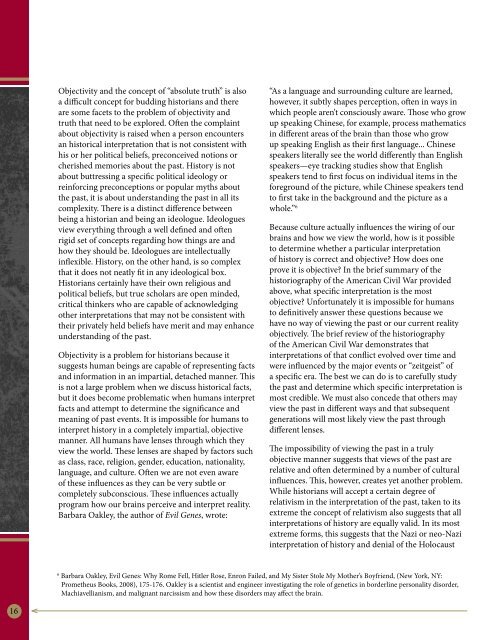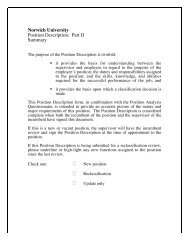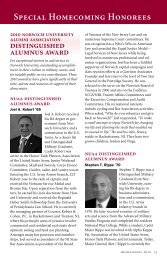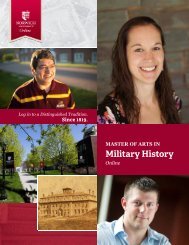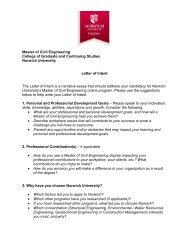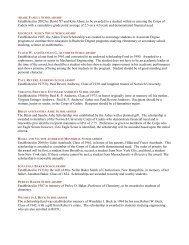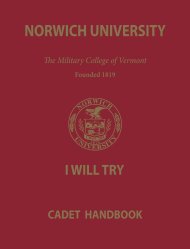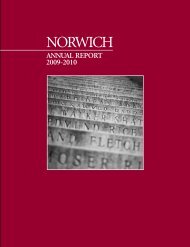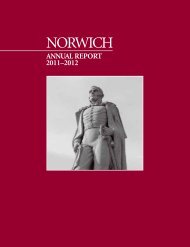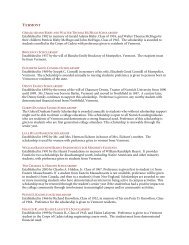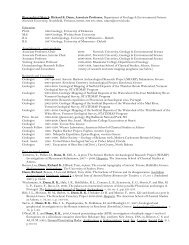Surviving Master's-Level History Programs at Norwich University: A ...
Surviving Master's-Level History Programs at Norwich University: A ...
Surviving Master's-Level History Programs at Norwich University: A ...
- No tags were found...
Create successful ePaper yourself
Turn your PDF publications into a flip-book with our unique Google optimized e-Paper software.
Objectivity and the concept of “absolute truth” is alsoa difficult concept for budding historians and thereare some facets to the problem of objectivity andtruth th<strong>at</strong> need to be explored. Often the complaintabout objectivity is raised when a person encountersan historical interpret<strong>at</strong>ion th<strong>at</strong> is not consistent withhis or her political beliefs, preconceived notions orcherished memories about the past. <strong>History</strong> is notabout buttressing a specific political ideology orreinforcing preconceptions or popular myths aboutthe past, it is about understanding the past in all itscomplexity. There is a distinct difference betweenbeing a historian and being an ideologue. Ideologuesview everything through a well defined and oftenrigid set of concepts regarding how things are andhow they should be. Ideologues are intellectuallyinflexible. <strong>History</strong>, on the other hand, is so complexth<strong>at</strong> it does not ne<strong>at</strong>ly fit in any ideological box.Historians certainly have their own religious andpolitical beliefs, but true scholars are open minded,critical thinkers who are capable of acknowledgingother interpret<strong>at</strong>ions th<strong>at</strong> may not be consistent withtheir priv<strong>at</strong>ely held beliefs have merit and may enhanceunderstanding of the past.Objectivity is a problem for historians because itsuggests human beings are capable of representing factsand inform<strong>at</strong>ion in an impartial, detached manner. Thisis not a large problem when we discuss historical facts,but it does become problem<strong>at</strong>ic when humans interpretfacts and <strong>at</strong>tempt to determine the significance andmeaning of past events. It is impossible for humans tointerpret history in a completely impartial, objectivemanner. All humans have lenses through which theyview the world. These lenses are shaped by factors suchas class, race, religion, gender, educ<strong>at</strong>ion, n<strong>at</strong>ionality,language, and culture. Often we are not even awareof these influences as they can be very subtle orcompletely subconscious. These influences actuallyprogram how our brains perceive and interpret reality.Barbara Oakley, the author of Evil Genes, wrote:“As a language and surrounding culture are learned,however, it subtly shapes perception, often in ways inwhich people aren’t consciously aware. Those who growup speaking Chinese, for example, process m<strong>at</strong>hem<strong>at</strong>icsin different areas of the brain than those who growup speaking English as their first language... Chinesespeakers literally see the world differently than Englishspeakers—eye tracking studies show th<strong>at</strong> Englishspeakers tend to first focus on individual items in theforeground of the picture, while Chinese speakers tendto first take in the background and the picture as awhole.” 6Because culture actually influences the wiring of ourbrains and how we view the world, how is it possibleto determine whether a particular interpret<strong>at</strong>ionof history is correct and objective? How does oneprove it is objective? In the brief summary of thehistoriography of the American Civil War providedabove, wh<strong>at</strong> specific interpret<strong>at</strong>ion is the mostobjective? Unfortun<strong>at</strong>ely it is impossible for humansto definitively answer these questions because wehave no way of viewing the past or our current realityobjectively. The brief review of the historiographyof the American Civil War demonstr<strong>at</strong>es th<strong>at</strong>interpret<strong>at</strong>ions of th<strong>at</strong> conflict evolved over time andwere influenced by the major events or “zeitgeist” ofa specific era. The best we can do is to carefully studythe past and determine which specific interpret<strong>at</strong>ion ismost credible. We must also concede th<strong>at</strong> others mayview the past in different ways and th<strong>at</strong> subsequentgener<strong>at</strong>ions will most likely view the past throughdifferent lenses.The impossibility of viewing the past in a trulyobjective manner suggests th<strong>at</strong> views of the past arerel<strong>at</strong>ive and often determined by a number of culturalinfluences. This, however, cre<strong>at</strong>es yet another problem.While historians will accept a certain degree ofrel<strong>at</strong>ivism in the interpret<strong>at</strong>ion of the past, taken to itsextreme the concept of rel<strong>at</strong>ivism also suggests th<strong>at</strong> allinterpret<strong>at</strong>ions of history are equally valid. In its mostextreme forms, this suggests th<strong>at</strong> the Nazi or neo-Naziinterpret<strong>at</strong>ion of history and denial of the Holocaust6Barbara Oakley, Evil Genes: Why Rome Fell, Hitler Rose, Enron Failed, and My Sister Stole My Mother’s Boyfriend, (New York, NY:Prometheus Books, 2008), 175-176. Oakley is a scientist and engineer investig<strong>at</strong>ing the role of genetics in borderline personality disorder,Machiavellianism, and malignant narcissism and how these disorders may affect the brain.16


